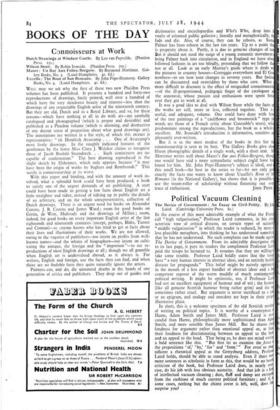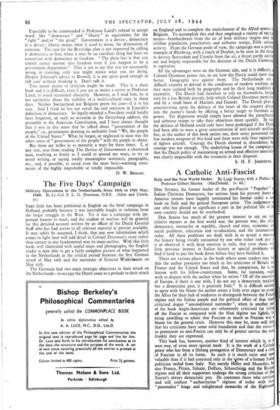Political Vacuum Cleaning
The Device of Government : An Essay on Civil Polity. By J Laird. (Cambridge University Press. 6s.) IN the course of this most admirable example of what the Fre call " high vulgarisation," Professor Laird comments, in his c acteristic tone of critical distaste, on certain types of scien " middle vulgarisation " in which the reader is seduced, by more less plausible metaphors, into thinking .he has understood someth that he has not understood. No such complaint can be made aga The Device of Government. From its admirably descriptive a to its last page, it pays its readers the compliment Professor La paid the troops he lectured to. It assumes that they are willing take some trouble. Professor Laird boldly states that the t have " a very human interest in abstract ideas, and an entirely heal distaste for propaganda." This belief might be naively optimi in the mouth of a less expert handler of abstract ideas and a 1 competent exposer of the warm muddle of much contempo political writing. It might be optimistic, too, if Professor had not an excellent equipment of humour and of wit ; the hum (like all genuine Scottish humour being rather grim) and the sometimes rather cruel. But argument is never sacrificed to a or an epigram, and analogy and anecdote are kept in their pro illustrative place.
In short, this is a welcome specimen of the old Scottish me of writing on political topics. It is worthy of a countryman Hume, Adam Smith and James Mill. Professor Laird is nn', candid than Hume, philosophically more sophisticated than Ad Smith, and more sensible than James Mill. But he shares th fondness for argument' rather than emotional appeal or, at le their fondness for discriminating between an appeal to the he and an appeal to the head. That being so, he does not mind writ a bald sentence like this. " But first let us examine the,force the prepositions ' of," by," for' and ' from.' " For even so m nificent a rhetorical appeal as the Gettysburg address, Profes. Laird holds, should be able to stand analysis. Even ff there more sentences as scholastic in form as this, that would be no hos criticism of the book, but Professor Laird does, in nearly case, do his job with less obvious austerity. And that job is a k of intellectual vacuum cleaning ; dust, fluff and damp are extract from the cushions of much current political furniture - and if, some cases, nothing but the chintz cover is left, well, does surprise you?
Especially to be commended is Professor Laird's refusal to accept words like " democracy " and " liberty " as equivalents for the " right " and/or " the good" Government is a device ; democracy is a device ; liberty means what it used to mean, the diminution of coercion. The case for the Beveridge plan is not improved by calling it democratic or free, when it may be an excellent thing but have no connexion with democracy or freedom. "The plain fact is that you cannot coerce anyone into freedom even if you happen to be a government department." That is not to say that you are necessarily wrong in coercing, only you might notice what you are doing. Despite Johnson's advice to Boswell, it is not quite good enough to talk cant without thinking it. Don't talk it.
Two minor points of criticism might be made. This is a short book and it is difficult, even if you are as meaty a writer as Professor Laird, to avoid occasional obscurity. However, as I read him, he is too optimistic about the viability of. a multi-cultural state in these days. Neither Switzerland nor Belgium prove his case—if it is his- case. And I think he has not noted the- real omission in Lincoln's definition of democracy. So legally-minded a President could hardly have forgotten, on such an occasion as the Gettysburg address,- the preamble to the American Constitution, and I have always thought that it was in this sense that he talked about " government of the people," i.e., government drawing its authority from " We, the people of the United States." What he forgot, or neglected to state was the other sense of "government of the people" with the people as object.
But these are trifles in so masterly a tract for these times. I, at any rate, rose from reading The Device of Government a chastened man, resolving as firmly as I could to amend my ways, to try to avoid writing or saying totally meaningless sentences, paragraphs, etc., and, if possible, to avoid even the most heart-warming state- ments of the highly improbable or totally impossible.
D. W. BROGAN.



























 Previous page
Previous page